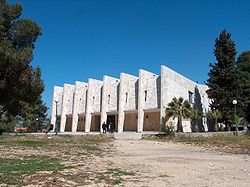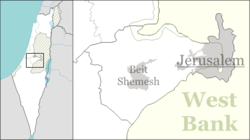Kiryat Ye'arim
Kiryat Ye'arim
קִרְיַת יְעָרִים كريات يعاريم | |
|---|---|
| Hebrew transcription(s) | |
| • ISO 259 | Qiryat Yˁarim |
| • Also spelled | Kiryat Yearim (unofficial) |
 Beth midrash in Kiryat Ye'arim | |
| Coordinates: 31°48′12″N 35°6′0″E / 31.80333°N 35.10000°E | |
| Country | |
| District | |
| Government | |
| • Head of Municipality | Yitzhak Ravitz |
| Population (2022)[1] | |
• Total | 6,555 |
| Name meaning | Town of forests |
Kiryat Ye'arim (Hebrew: קִרְיַת יְעָרִים), also known as Telz-Stone, is a strictly Orthodox town in the Jerusalem District of Israel. It is located in the approximate area of an ancient place mentioned in the Bible, from which it takes its name. It is bordered on one side by the Muslim Arab village of Abu Ghosh, and on the other side by the secular Jewish community of Neve Ilan.[2] In 2022 it had a population of 6,555.
Names
[edit]Kiryat Ye'arim
[edit]For the official name, see Biblical connection section.
Telz-Stone
[edit]Despite the official name of "Kiryat Ye'arim", the town is widely known as Telz-Stone, after the Telshe or Telz yeshiva, who had a branch there between 1977–79,[3] and American Greetings founder-chairman Irving I. Stone, who helped to finance the community's early development.[2]
Geography
[edit]Kiryat Ye'arim is located approximately 10 kilometres (6.2 mi) west of Jerusalem, just north of the Tel Aviv – Jerusalem highway. Neighboring Kiryat Ye'arim to the northeast is the Arab town of Abu Ghosh. Kiryat Ye'arim is between 661.8 and 749.5 m (2,171 and 2,459 ft) above sea level.[4]
Biblical connection
[edit]The modern town of Kiryat Ye'arim (Town of Forests) is named for the homonymous ancient city (common English spelling: Kiriath-Jearim), mentioned in the Hebrew Bible as the site where the Ark of the Covenant has been kept for 20 years, according to the Book of Samuel. From here the Ark was taken to Jerusalem by King David (I Chronicles 13, 5-8).[citation needed]
History
[edit]
Six hundred dunams of modern-day Kiryat Ye'arim were purchased before 1948[when?] by Menashe Elissar,[clarification needed] a businessman who was attracted to the site as the location of the biblical Kiryat Ye'arim.[5]
The modern community was established in 1973 by American ultra-Orthodox Jews.[6] A group of students and teachers of the American Telshe Yeshiva (Yeshivat Telz in Hebrew) were active there in 1977-79.[3]
Demography
[edit]According to the Israel Central Bureau of Statistics (CBS), at the end of 2019 Kiryat Ye'arim had a population of 6,309 predominantly Jewish residents. Many of the residents are immigrants from North America, Europe and South Africa.

Institutions
[edit]Kiryat Ye'arim is home to three Orthodox post-high school yeshivas aimed at foreign students, particularly from the U.S.: Neveh Zion, Keser Dovid and Yishrei Lev.[7][8]
It is also home to a Sephardic Haredi yeshiva - Be'er Yitzhak and another yeshiva: Me'orot Hatorah.
References
[edit]- ^ "Regional Statistics". Israel Central Bureau of Statistics. Retrieved 21 March 2024.
- ^ a b Nefesh B'Nefesh Community Profiles: Telz-Stone/Kiryat Yearim. [dead link], more precisely: Telz-Stone removed from page.
- ^ a b Rose, Binyamin. "The Prince of America's Torah Renaissance: An appreciation of Rav Mordechai Gifter, ztz"l, on his tenth yahrtzeit". Mishpacha, 29 December 2010, pp. 33–34.
- ^ "Local Authorities in Israel 2005, Publication #1295 - Municipality Profiles - Kiryat Ye'arim" (PDF) (in Hebrew). Israel Central Bureau of Statistics. Retrieved 2008-02-16.
- ^ "The Plot Thickens in Saga Between Hollywood Has-been and Haredi Community". Haaretz.
- ^ Stein, Rebecca L. (August 26, 2008). Itineraries in Conflict: Israelis, Palestinians, and the Political Lives of Tourism. Duke University Press. ISBN 9780822391203 – via Google Books.
- ^ "Yishrei Lev". Yishrei Lev. Retrieved 1 November 2023.
- ^ "Kiryat Yearim (Telz-Stone)". Nefesh B'Nefesh - Aliyahpedia. Retrieved 19 April 2016.



